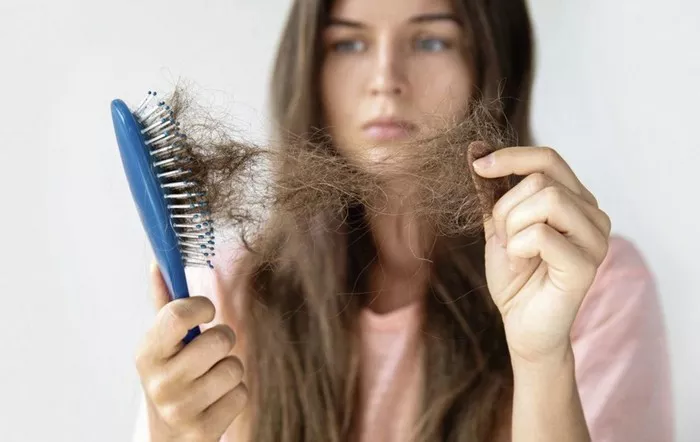Hair is often considered one of the most defining features of our appearance. So, when you find yourself asking, “Why is my hair falling out every time I touch it?” it can be a cause for concern. In this comprehensive guide, we will delve into the world of hair fall, exploring the various causes, potential solutions, and preventive measures you can take to combat this common issue.
The Causes of Hair Fall
Understanding the underlying causes of hair fall is essential for finding effective solutions. Hair fall can be attributed to a multitude of factors:
1. Genetics: Family history plays a significant role in determining your hair’s thickness and vulnerability to hair fall. If your parents or grandparents experienced hair loss, you might be genetically predisposed.
2. Hormonal Changes: Hormonal fluctuations, such as those during pregnancy, menopause, or thyroid disorders, can disrupt the hair growth cycle, leading to hair fall.
3. Stress and Anxiety: High levels of stress can lead to hair fall. Chronic stress triggers hormonal imbalances, which can negatively impact hair health.
4. Nutritional Deficiencies: Inadequate intake of essential nutrients like vitamins, minerals, and protein can weaken hair, leading to hair fall.
5. Overstyling: Excessive heat styling, tight hairstyles, and the use of harsh hair products can damage the hair shaft and cause hair fall.
See Also: [Revealed!] Can Changes in Water Quality Lead to Hair Loss?
Solutions for Hair Fall
Addressing hair fall requires a multi-pronged approach. Here are potential solutions to consider:
1. Hair Care Routine: Adopt a gentle hair care routine that includes a mild shampoo, a conditioner, and a wide-tooth comb. Avoid over-washing, and opt for sulfate-free products.
2. Nutrient-Rich Diet: Consume a well-balanced diet rich in vitamins, minerals, and protein. Foods like salmon, eggs, and leafy greens can promote hair health.
3. Stress Management: Practice stress-reduction techniques such as meditation, yoga, and deep breathing exercises to manage stress levels and reduce hair fall.
4. Scalp Massage: Regular scalp massages can increase blood circulation and stimulate hair follicles, promoting hair growth and reducing hair fall.
Preventive Measures for Hair Fall
Preventing hair fall is often more effective than treating it once it begins. Here are some preventive measures to consider:
1. Gentle Handling: Avoid excessive brushing or combing and handle your hair with care. Use a wide-tooth comb to detangle wet hair to minimize damage.
2. Heat Styling Precautions: If you must use heat styling tools, apply a heat protectant and use the lowest heat setting necessary to prevent damage.
3. Hair Accessories: Use hair accessories that do not pull or strain your hair, and avoid tight hairstyles that can weaken the hair shaft.
4. Regular Check-Ups: If you suspect a hormonal or nutritional issue is causing your hair fall, consult a healthcare professional for a thorough evaluation.
Professional Treatments for Hair Fall
In severe cases of hair fall, professional treatments may be necessary. These treatments are typically administered by dermatologists or hair restoration specialists:
1. Topical Treatments: Medications like minoxidil can be applied topically to stimulate hair growth and slow down hair fall.
2. Oral Medications: Some oral medications can help address hormonal imbalances and prevent hair fall.
3. Platelet-Rich Plasma (PRP) Therapy: PRP therapy involves using your blood’s plasma to stimulate hair growth and reduce hair fall.
4. Hair Transplant: For advanced cases of hair loss, hair transplant surgery is an option. This involves transplanting healthy hair follicles to areas with thinning or no hair.
Lifestyle and Habits Impact on Hair Fall
Our daily lifestyle and habits can significantly influence hair fall. Here are some considerations to keep in mind:
1. Smoking: Smoking can constrict blood vessels and reduce blood flow to the scalp, leading to hair fall.
2. Alcohol: Excessive alcohol consumption can deplete essential nutrients, contributing to hair fall.
3. Sun Protection: Excessive sun exposure can damage hair. Wear a hat or use a protective spray when exposed to the sun for extended periods.
4. Hydration: Dehydration can negatively affect hair health. Ensure you are well-hydrated for optimal hair growth.
When to Seek Professional Help?
While some degree of hair fall is normal, if you notice excessive or sudden hair loss, it’s essential to seek professional advice. A dermatologist or healthcare provider can help diagnose the underlying cause of your hair fall and recommend the most appropriate treatment or intervention.
In conclusion
The question of “Why is my hair falling out every time I touch it?” has multiple potential answers, from genetics to lifestyle factors. Understanding these causes and considering the various solutions and preventive measures can help you maintain healthy and luscious locks. If your hair fall continues or worsens, don’t hesitate to consult with a professional for tailored advice and treatment options.


